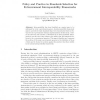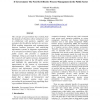CSREAEEE
2006
14 years 1 months ago
2006
The Ministry of Labor in Saudi Arabia started E-Government applications three years ago. The Ministry has undertaken major attempts to re-engineer its interface with the labor and...
CSREAEEE
2006
14 years 1 months ago
2006
- The Internet potentially provides government with great opportunities for delivering services, encouraging democracy and promoting economic vitality. E-government is regarded wit...
DGO
2008
14 years 1 months ago
2008
The promise of E-Government (and its more recent spin-offs of EDemocracy, E-Participation, E-Procurement, and a range of other "E-`s") is to engage citizenry in governme...
EGOV
2004
Springer
14 years 4 months ago
2004
Springer
Inherent complexity of the e-Government application domain is also reflected in the workflows of e-Government service provision. This paper reports on how some real examples e-Gove...
BCI
2009
IEEE
14 years 5 months ago
2009
IEEE
e-Government services are emerging rapidly in the developing world. Many countries use e-Government as an enabling tool to increase efficiency, enhance transparency, collect more ...
EGOV
2004
Springer
14 years 5 months ago
2004
Springer
The recently proposed intermediation schemes in e-government are meant to speed up and facilitate integration and access to services offered by local and regional public sector ser...
ACMICEC
2004
ACM
14 years 5 months ago
2004
ACM
Public administrations of all over the world invest an enormous amount of resources in e-government. How the success of egovernment can be measured is often not clear. E-governmen...
EGOV
2005
Springer
14 years 5 months ago
2005
Springer
Interoperability has been identified as a major issue to be addressed by every e-government agency. An interoperability framework aims to provide the basic standards that every de...
SAC
2005
ACM
14 years 5 months ago
2005
ACM
Over the last few years rapid progress has been made in moving from conceptual studies, “whitepapers” and initiatives to the actual deployment of e-Government systems [13]. In...
HICSS
2006
IEEE
14 years 6 months ago
2006
IEEE
The concept of e-government has evolved from the domain of e-business where enterprises need to collaborate with partners, suppliers and customers for the effective delivery of e-...



